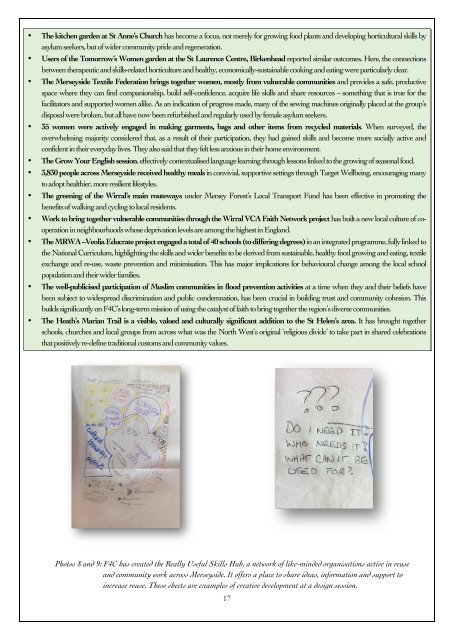Programme Evaluation 2014-15
You also want an ePaper? Increase the reach of your titles
YUMPU automatically turns print PDFs into web optimized ePapers that Google loves.
• The kitchen garden at St Anne’s Church has become a focus, not merely for growing food plants and developing horticultural skills by<br />
asylum seekers, but of wider community pride and regeneration.<br />
• Users of the Tomorrow’s Women garden at the St Laurence Centre, Birkenhead reported similar outcomes. Here, the connections<br />
between therapeutic and skills-related horticulture and healthy, economically-sustainable cooking and eating were particularly clear.<br />
• The Merseyside Textile Federation brings together women, mostly from vulnerable communities and provides a safe, productive<br />
space where they can find companionship, build self-confidence, acquire life skills and share resources – something that is true for the<br />
facilitators and supported women alike. As an indication of progress made, many of the sewing machines originally placed at the group’s<br />
disposal were broken, but all have now been refurbished and regularly used by female asylum seekers.<br />
• 35 women were actively engaged in making garments, bags and other items from recycled materials. When surveyed, the<br />
overwhelming majority considered that, as a result of their participation, they had gained skills and become more socially active and<br />
confident in their everyday lives. They also said that they felt less anxious in their home environment.<br />
• The Grow Your English session, effectively contextualised language learning through lessons linked to the growing of seasonal food.<br />
• 3,830 people across Merseyside received healthy meals in convivial, supportive settings through Target Wellbeing, encouraging many<br />
to adopt healthier, more resilient lifestyles.<br />
• The greening of the Wirral’s main routeways under Mersey Forest’s Local Transport Fund has been effective in promoting the<br />
benefits of walking and cycling to local residents.<br />
• Work to bring together vulnerable communities through the Wirral VCA Faith Network project has built a new local culture of cooperation<br />
in neighbourhoods whose deprivation levels are among the highest in England.<br />
• The MRWA –Veolia Educrate project engaged a total of 40 schools (to differing degrees) in an integrated programme, fully linked to<br />
the National Curriculum, highlighting the skills and wider benefits to be derived from sustainable, healthy food growing and eating, textile<br />
exchange and re-use, waste prevention and minimisation. This has major implications for behavioural change among the local school<br />
population and their wider families.<br />
• The well-publicised participation of Muslim communities in flood prevention activities at a time when they and their beliefs have<br />
been subject to widespread discrimination and public condemnation, has been crucial in building trust and community cohesion. This<br />
builds significantly on F4C’s long-term mission of using the catalyst of faith to bring together the region’s diverse communities.<br />
• The Heath’s Marian Trail is a visible, valued and culturally significant addition to the St Helen’s area. It has brought together<br />
schools, churches and local groups from across what was the North West’s original ‘religious divide’ to take part in shared celebrations<br />
that positively re-define traditional customs and community values.<br />
Photos 8 and 9: F4C has created the Really Useful Skills Hub, a network of like-minded organisations active in reuse<br />
and community work across Merseyside. It offers a place to share ideas, information and support to<br />
increase reuse. These sheets are examples of creative development at a design session.<br />
17


